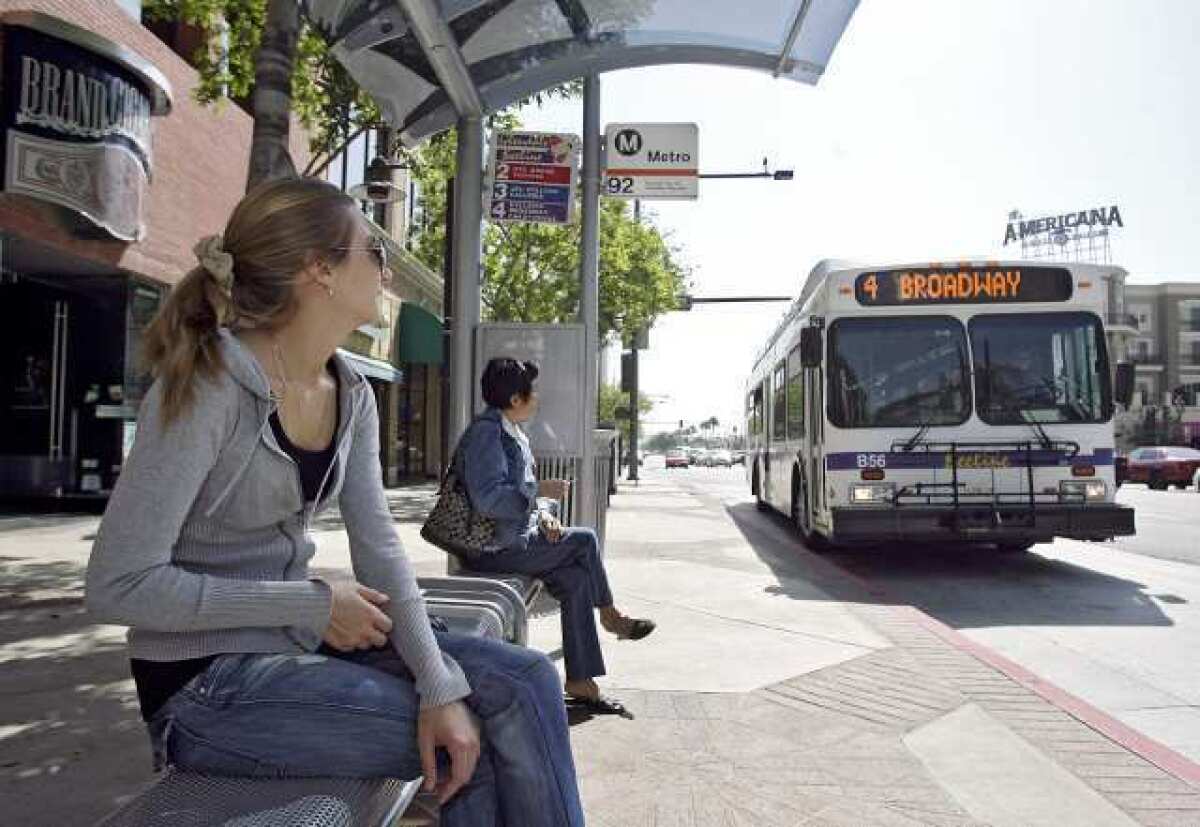Glendale touts new buses as ‘extremely low-emission,’ critics say any fossil fuel is too much

- Share via
Glendale’s local Beeline bus service will be getting five new buses officials say are needed for service changes, including a new route, planned to roll out in July.
Several Glendale City Council members hailed the buses — outfitted with compressed natural-gas engines — as the most environmentally friendly option short of going full electric, even as some environmentalists have criticized the move as contributing to climate change by adding fossil-fuel vehicles to the road.
Three of the buses will be used on a new Beeline route planned for Glendale Avenue. The other two buses will be used to increase service frequency on Chevy Chase Drive, according to a city report.
“It’s not zero emission, but it’s extremely low emission,” said Glendale Mayor Ara Najarian, who is on the Metro board, of the Cummins Westport L9N engine that the buses will use during a City Council meeting last week. At the same meeting, Glendale officials voted to retrofit two older buses with the engines.
“Perhaps we can say that these will be the last fossil-fuel buses that we will be putting on the road,” Najarian added.
Glendale will soon be testing an electric bus to get a sense of potential issues related to charging, range and maintenance, Najarian said after the meeting at which the new buses were approved.
According to Glendale officials, the city does not yet have the infrastructure to support a fully electric fleet of buses.
While Carlo De La Cruz, of the Sierra Club, acknowledged the logistical challenges of going electric, he said the challenges are nothing that other agencies of similar sizes haven’t faced.
“It’s a question of political leadership and political will,” said De La Cruz, who has a background in urban planning and focuses on electric buses for the environmental group.
“It’s time for cities like Glendale to see that the technology is ready for widespread adoption,” he added.
All public transit systems in the state must transition to 100% zero emission by 2040 to comply with a mandate from the California Air Resources Board.
Discussing the relative cleanness of compressed natural-gas engines compared to something like diesel engines has become what De La Cruz said is a misguided talking point.
Although the compressed natural-gas engines release fewer cancer-causing particulates, they still emit gases that contribute to climate change and poor air quality, according to De La Cruz, who is not a scientist but has done work around transportation.
All of Los Angeles’ Metro buses are currently powered by compressed natural-gas engines, according to Metro spokesman Rick Jager. He said the engines are significantly cleaner than diesel.
Metro has a fleet of about 2,200 buses; Glendale has a fleet of roughly 80.
Los Angeles began testing its first electric bus in July, with a goal of converting all of its buses to electric by 2030, Jager said.
By the end of this year, Metro plans to convert its Orange Line — which runs through the San Fernando Valley — to electric.
The following year, the agency intends to also fully convert its Silver Line, which runs between El Monte, downtown L.A. and Gardena.
The conversions require significant infrastructure changes, Jager said.
“So it’ll be kind of slow steps for us,” he said.
Najarian said there has been discussion among Metro officials about whether the 2030 deadline is feasible.
According to Jager, the goal hasn’t changed.
“Our board has told us that it’s reasonable, so we’re doing everything we can to meet that date,” Jager said. “That’s their mandate.”
Beginning in July, Glendale will be making additional changes to its Beeline service. Routes that run along Brand Boulevard and Central Avenue will be consolidated into just Central, with increased trips, according to a city report.
There will also be two pilot projects. One will add evening service between the Glendale Community College campuses from Monday through Thursday, and the other will add evening service on Fridays and Saturdays in the downtown area.
